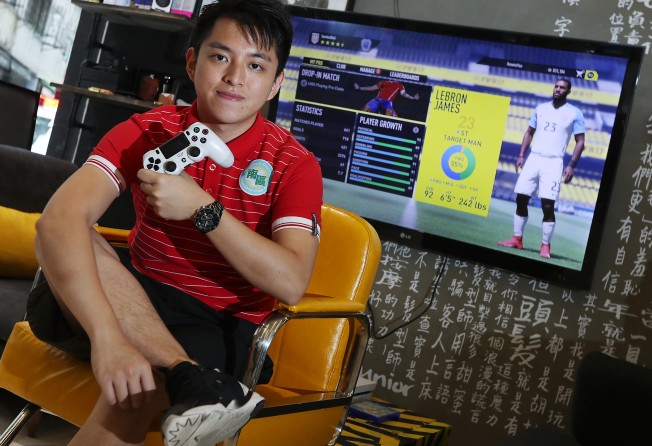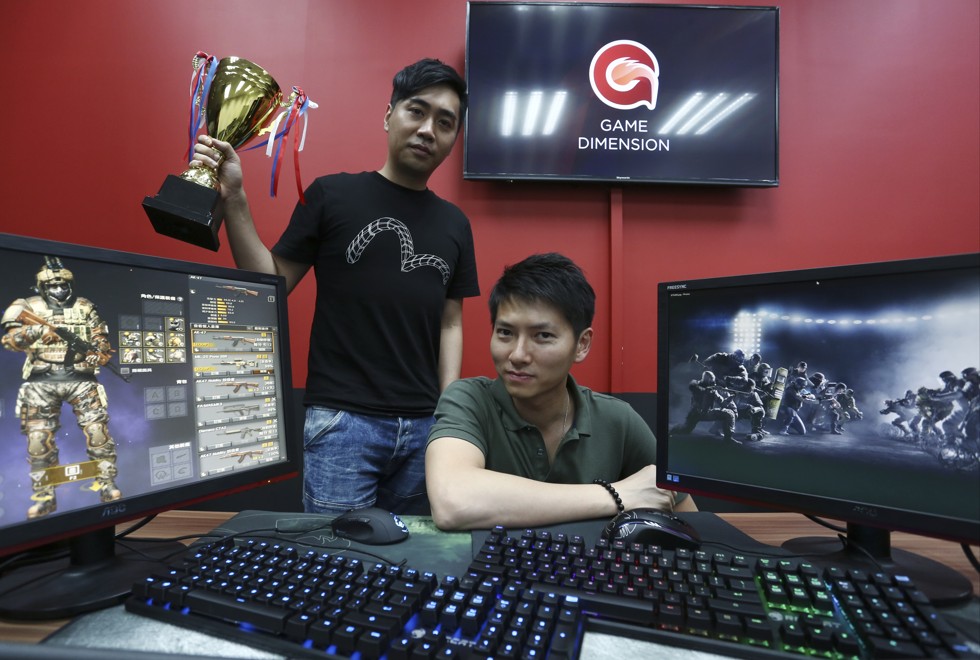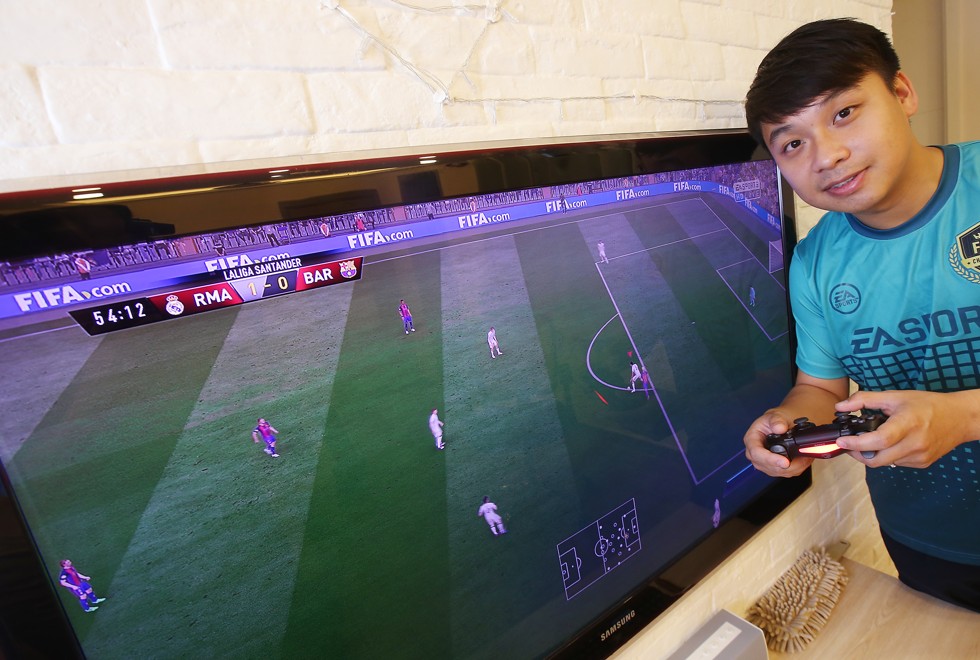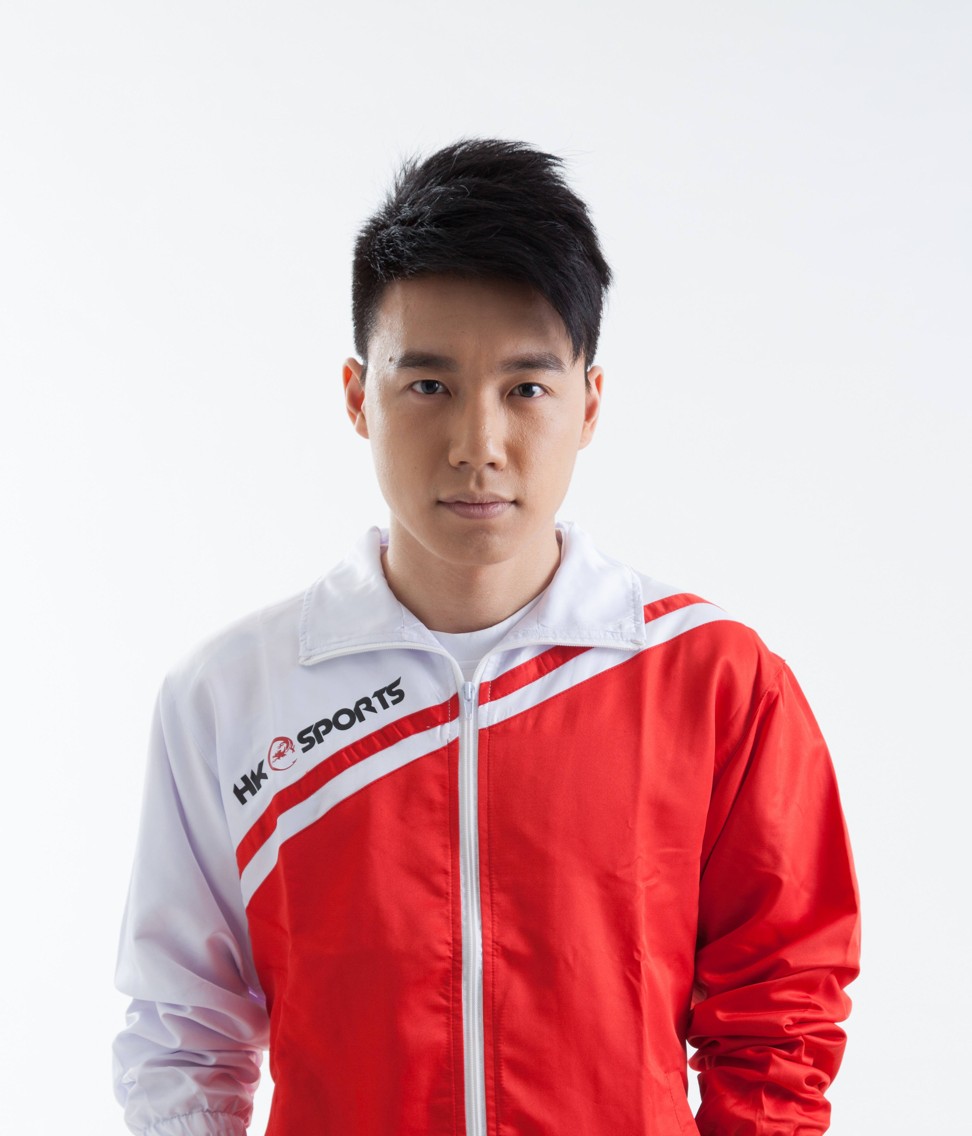Gaming goes for gold in Hong Kong as businesses look to cash in on growing e-sports industry
There is considerable debate about the pros and cons of e-sports in traditional Hong Kong, but serious players see it as a way to make big money

Unlike many professional soccer players, Ronnie Yau Man-lung makes money by playing the game in the virtual world.
When the 22 year old was given the No 23 jersey by local team KC Southern District Football Club in March, he was signed to represent the club in an online tournament organised by world soccer body Fifa. At one stage, he was paid a five-figure sum in Hong Kong dollars for playing just one game.
“It’s like my second job,” Yau, who is a full-time office worker, said.
E-sports, or electronic sports, are multi-player video game tournaments where gamers compete for hefty cash prizes. Yau is one of the many young people in Hong Kong who are looking for fame and fortune as gamers.
His friend, Sonny Chui Chi-hang, 29, qualified for the grand final of the soccer tournament after winning a championship in Doha in Qatar where he was awarded US$1,000 and an air ticket to the London game.
The full-time engineer also won US$10,000 and US$4,000 for placing second and fourth in earlier tournaments.
“Some think it is useless playing video games, but people are making lots of money from it,” he said.
Global revenue in the e-sports industry is expected to grow to US$1.5 billion as brand investment doubles, according to Newzoo, an international firm specialising in e-sports and games.
This is a great time for gamers, as support for e-sports in Hong Kong is growing tremendously
Hong Kong is aiming for a slice of the gaming market. Finance minister Paul Chan Mo-po has described e-sports “as a new sector with economic development potential, which can help boost the local gaming industry and information and technology development such as the application of virtual reality technology”.
In June, Three Group, the mobile telecommunications arm of CK Hutchison, which is owned by the city’s richest man, Li Ka-shing, and game system provider Razer unveiled the US company’s first store in Hong Kong.
Razer co-founder and chief executive Tan Min-liang said at the time: “This is a great time for gamers, as support for e-sports in Hong Kong is growing tremendously, especially from the Hong Kong government.”
Developing scene
When Simon Yip Wing-wo quit his banking job last year to form a video game marketing company, he noticed the e-sports market here was still developing, but was confident it would boom sooner or later.
So he set up Game Dimension with an old friend and former paid gamer Alan Tsoi Shiu-lun. The duo make money by holding tournaments in their Kwun Tong studio, which can house 50 people at one sitting.
“We think it’s the right time to do the business because e-sports in South Korea, Taiwan and mainland China is huge. And Hong Kong cannot escape from this,” Yip said.
Hong Kong will hold one of its biggest e-sports events – the E-sports and Music Festival – at the Hong Kong Coliseum from August 4 to 6. The HK$35 million event is being funded by the government.
But cynics say the government is just cashing in on an increasingly lucrative global business.
The Hong Kong Tourism Board, which is organising the event, expects some 50,000 video gamers and K-pop fans to turn up. It has been promoting the event in the past few months in a bid to boost tourism numbers, which fell by 4.5 per cent in 2016.
The matches will be streamed live, but the organisers insist fans will still enjoy watching the event in person, claiming it generates an atmosphere equivalent to football or Formula One.
Alan Tsoi Shiu-lun, director of game marketing company Game Dimension, said e-sports were not just a business, but a “universal activity”.
“E-sports require the public’s engagement,” he said.
Tsoi said next month’s event has been hyped up by inviting big gamers and commentators, but he was doubtful if it could attract the public. “It seems like it’s promoting the popularity of certain personalities, rather than the overall trend,” he added.
Compared to other places in the region, Hong Kong appears to be taking baby steps when it comes to e-sports.
In mainland China, where e-sports were first recognised as an official sport in 2003, the country boasts more than 400 million online gamers who spent about 114 billion yuan (HK$132 billion) in 2015. More than half are believed to regularly watch e-sports.
The Taiwanese e-Sports League was founded in 2008. There are several successful Taiwanese e-sport teams who tend to live together to facilitate daily training sessions, which can last up to 15 hours.
Tsoi, who was a paid video gamer for Garena, which operates shooting game Alliance of Valiant Arms, used to fly to Taiwan every weekend for either training or competing in an elite league.
He said people in Taiwan were generally more open to the gaming industry because the island has a more relaxed lifestyle than Hong Kong.
Yip said stereotypes of gamers were still deeply rooted in society, which he thinks is why the industry has been developing slowly here.
“Parents usually think playing video games means poor school grades. And since having a university degree seems to be a must here, there is less time for teenagers to develop in this field,” Yip said.
Harmful effects?
There are ongoing concerns about the social consequences of e-gaming. Some of the industry’s top players have dropped out of full-time education in order to pursue their dream.
One of Hong Kong’s most successful players, Kurtis Lau Wai-kin, known as “Toyz”, left school in Form Four and moved to Taiwan with his team in 2012. Despite making money, he temporarily left the industry after developing a hand injury.
But he returned to form with Wang “Stanley” June Tsan in 2014. Aged 25 and 26, they are considered past their peak as e-sports players given that reflexes and brain response are found to decline after 24, according to a 2014 study by Simon Fraser University in Canada.
Fifa player Yau said Hongkongers were generally negative about gamers, which he did not think was fair given the high earning potential in international competitions.
“There are still lots of stereotypes about video gamers,” he said. “A classic example is I am always told that I won’t be able to buy a flat by playing video games full time.”
Dr Kean Poon Kei-yan, an assistant professor at the Education University, said technology could undoubtedly be used to enhance a child’s education, particularly those who suffer from dyslexia or attention deficit hyperactivity disorder.
But she said anyone who became an obsessive gamer could harm themselves.
“The internet or the virtual world seems to be easily overused or even addictive,” she said.
“The stimulating content, visual and auditory stimulation, autonomy and immediate excitement all contribute to a highly psychoactive experience, meaning it affects the individual’s mood and behaviour. An e-sports or gaming career may therefore increase psychological dependence on the virtual world, and may negatively impact adolescents’ overall well-being such as relationships, employment and health.
“Much research has confirmed that internet behaviour or online games produce clear changes to mood and behaviour, working like drugs or compulsive gambling. Sometimes these things have unintended and unexpected harmful effects.”
But neuroscience studies suggest that playing some action games for 30 minutes a day over a period of two months can stimulate brain growth and boost memory.
Critics of e-sports also fear it could contribute to a growing youth obesity epidemic.
Dr Ian Lam Chun-bun, associate head of the department of early childhood education at the Education University, said individuals should be able to choose their own path of development, but warned against children becoming obsessive gamers at a very young age.
He said recent studies suggested young children should not play for more than one hour a day, particularly because excessive use could increase the risk of obesity later in life.
“There is nothing wrong in being a professional gamer or YouTuber to make a living,” he said.
“But in early childhood, children should not be exploring the media all by themselves. There should be time limits and there should be a real adult exploring the media with the child.”
THE THOUGHTS OF CHAIRMAN YIP
Game Dimension owner Simon Yip Wing-wo’s views on what makes a good e-sports player:
● For many in Hong Kong, gaming is like a hobby, but if you are serious, you need to treat it more like a job
●You should probably expect to practice between eight and 10 hours per day; it depends how talented you are
● Overall you must be hard-working
● You should sign up for lots of competitions
● Try to find a good team; having supportive teammates is very important
● Also look for a good coach to guide you, just like in a soccer team
● In Taiwan, some teams like to do regular stretching exercises together between sessions, which can help to keep you fit and healthy
● Becoming a professional player takes time and depends on an individual’s skill, so you have to be patient. Some people will get a higher ranking much faster than others



